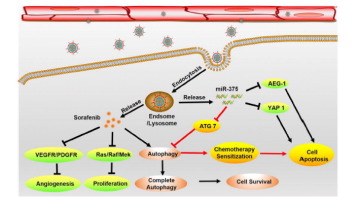Acta Biomaterialia ( IF 9.4 ) Pub Date : 2018-03-17 , DOI: 10.1016/j.actbio.2018.03.022 Pengxuan Zhao , Minsi Li , Yao Wang , Yan Chen , Chuanchuan He , Xiaojuan Zhang , Tan Yang , Yao Lu , Jia You , Robert J. Lee , Guangya Xiang

|
Sorafenib is a first-line drug for hepatocellular carcinoma (HCC). Autophagy has been shown to facilitate sorafenib resistance. miR-375 has been shown to be an inhibitor of autophagy. In this study, miR-375 and sorafenib were co-loaded into calcium carbonate nanoparticles with lipid coating (miR-375/Sf-LCC NPs). The nanoparticles had high loading efficiency and were ∼ 50 nm in diameter. Besides, the NPs could increase the stability and residence time of both drugs. Moreover, we demonstrated that autophagy was activated in HCC cells by sorafenib but not by miR-375/Sf-LCC NPs. In vitro, miR-375/Sf-LCC NPs exhibited pH-dependent drug release and potent cytotoxicity. In vivo, miR-375/Sf-LCC NPs increased miR-375 and sorafenib uptake in tumor (2 folds compared with Lipofectamine 2000-miR-375 and 2-5 folds compared with free sorafenib). Furthermore, miR-375/Sf-LCC NPs showed greatly enhanced therapeutic efficacy in an HCC xenograft model. These findings suggest that miR-375/Sf-LCC NPs may be a promising agent for the HCC therapy.
Statement of Significance
Hepatocellular carcinoma (HCC) is the most common primary liver tumor and the third leading cause of cancer mortality globally. In this manuscript, miR-375 and sorafenib were co-loaded into calcium carbonate nanoparticles with lipid coating (miR-375/Sf-LCC NPs) to treat HCC. We demonstrated that miR-375/Sf-LCC NPs can deliver sorafenib and miR-375 into HCC cells and tumor tissues, increase drug retention time in tumor, significantly inhibit autophagy and produce enhanced anti-tumor effect.
中文翻译:

通过miR-375 /索拉非尼自噬抑制脂质包覆的碳酸钙纳米颗粒中增强肝细胞癌的抗肿瘤效率
索拉非尼是肝细胞癌(HCC)的一线药物。自噬已被证明有助于索拉非尼耐药。miR-375已被证明是自噬的抑制剂。在这项研究中,将miR-375和索拉非尼共装载到带有脂质涂层的碳酸钙纳米颗粒中(miR-375 / Sf-LCC NPs)。纳米粒子具有高的加载效率,并且直径约为50 nm。此外,NPs可以增加两种药物的稳定性和停留时间。此外,我们证明了索拉非尼在HCC细胞中激活了自噬,但miR-375 / Sf-LCC NP却未激活。在体外,miR-375 / Sf-LCC NPs表现出pH依赖性药物释放和有效的细胞毒性。体内,miR-375 / Sf-LCC NPs增加了肿瘤中miR-375和索拉非尼的摄取(与Lipofectamine 2000-miR-375相比是2倍,与游离索拉非尼相比是2-5倍)。此外,miR-375 / Sf-LCC NP在HCC异种移植模型中显示出极大的治疗效果。这些发现表明,miR-375 / Sf-LCC NPs可能是HCC治疗的有前途的药物。
重要声明
肝细胞癌(HCC)是全球最常见的原发性肝癌,也是癌症死亡的第三大主要原因。在此手稿中,将miR-375和索拉非尼共装入具有脂质涂层的碳酸钙纳米颗粒(miR-375 / Sf-LCC NPs)中以治疗HCC。我们证明了miR-375 / Sf-LCC NP可以将索拉非尼和miR-375递送到HCC细胞和肿瘤组织中,增加在肿瘤中的药物保留时间,显着抑制自噬并产生增强的抗肿瘤作用。











































 京公网安备 11010802027423号
京公网安备 11010802027423号